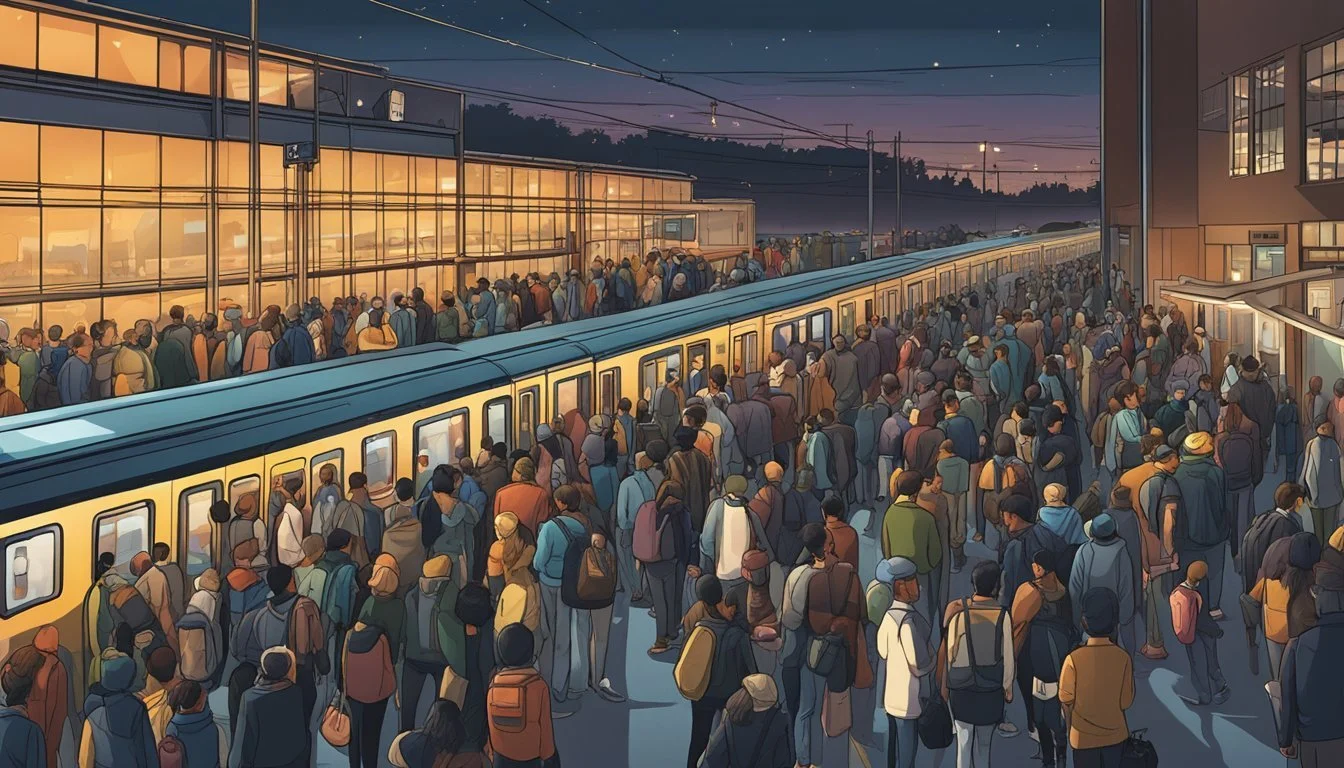Heart-Wrenching Journey: 'Last Train Home' Documentary Exposes the Harsh Reality of China's Migrant Workers!
Last Train Home offers a poignant glimpse into the lives of migrant workers in China. This 2009 documentary, directed by Lixin Fan, follows the Zhang family as they embark on the world's largest annual human migration during Chinese New Year. The film captures the struggles and sacrifices of 130 million workers who leave their rural homes to work in cities, returning only once a year to see their families.
The documentary has garnered critical acclaim and numerous accolades. It won Best Documentary Feature at the 2009 International Documentary Film Festival Amsterdam (IDFA), showcasing its impact on audiences and critics alike. Through intimate storytelling, Last Train Home reveals the human cost of China's rapid economic growth and industrialization.
Lixin Fan's directorial debut provides a raw and unfiltered look at the Zhang family's journey. The film explores themes of family separation, generational conflict, and the pursuit of a better life amidst China's economic transformation. Its unflinching portrayal of these issues has made Last Train Home a significant work in contemporary documentary filmmaking.
Background and Synopsis
Last Train Home offers a poignant look at the world's largest annual human migration. The documentary follows a Chinese migrant worker family as they journey home for the New Year holiday.
Plot Overview
The film centers on the Zhang family - parents Changhua and Suqin, who work in a garment factory in Guangzhou, and their children left behind in a rural village. Every Chinese New Year, the parents join 130 million other migrant workers on grueling train journeys back home.
The story focuses on their teenage daughter Qin, who resents her parents' absence. Tensions rise as Qin rebels against their plans for her future. The family's struggles highlight the human cost of China's rapid economic growth.
Intimate scenes of crowded train stations and family conflicts reveal the emotional toll of prolonged separation. The film captures both small personal moments and the massive scale of the annual migration.
Director and Production Company
Last Train Home was directed by Lixin Fan, a Chinese-Canadian filmmaker. It was his directorial debut after working as associate producer and sound recordist on other documentaries about China.
The film was produced by EyeSteelFilm, a Montreal-based company known for socially conscious documentaries. It received funding from multiple international sources, including the Sundance Institute.
Fan spent three years following the Zhang family, gaining remarkable access to their lives. His patient observational style allows the story to unfold naturally, without narration or interviews.
Cultural and Historical Context
The documentary illuminates a critical aspect of China's economic transformation. Since the 1980s, hundreds of millions of rural Chinese have moved to cities for factory work. This massive internal migration fueled China's rapid industrialization.
However, the hukou household registration system often prevents migrants from accessing social services in cities. Many leave children behind in villages with grandparents, seeing them only once a year.
The film shows how this arrangement strains family bonds and creates a generation of left-behind children. It explores themes of sacrifice, generational conflict, and the erosion of traditional rural life in modern China.
Themes and Analysis
"Last Train Home" explores complex social issues in modern China through an intimate family portrait. The documentary illuminates broader themes of economic transformation and cultural upheaval.
Family Dynamics and Struggles
The Zhang family serves as a microcosm of millions of migrant workers in China. Parents Chen and Suqin work in faraway factories, leaving their children behind in rural villages. This separation strains family bonds.
Their daughter Qin rebels against her parents' absence. She drops out of school to become a migrant worker herself, challenging traditional family roles. The film captures heated arguments and emotional reunions during rare family gatherings.
These fraught interactions reveal the human cost of China's rapid economic development. The Zhangs struggle to balance financial needs with familial duties.
Socio-economic Commentary
"Last Train Home" offers a stark look at China's rural-urban divide. Millions of unskilled workers flock to cities for factory jobs, fueling the country's manufacturing boom.
This mass migration powers China's economic growth but creates social upheaval. Rural areas lose working-age adults, while urban centers struggle with overcrowding.
The film shows cramped factory dormitories and grueling work conditions. It contrasts these with shots of gleaming city skylines, highlighting inequality in China's economic miracle.
Individual and Societal Change
The documentary captures a nation in flux. Traditional values clash with the realities of modern life. Rural youth like Qin yearn for urban opportunities and reject their parents' sacrifice.
China's pursuit of global economic dominance reshapes individual aspirations. Factory workers dream of a better life but face difficult trade-offs.
The annual train journey home becomes a powerful symbol. It represents both the ties that bind families and the forces pulling them apart. As China races towards modernity, "Last Train Home" asks what may be lost along the way.
Reception and Impact
"Last Train Home" garnered widespread acclaim and resonated deeply with audiences worldwide. The documentary's intimate portrayal of migrant workers in China struck a chord with viewers and critics alike.
Critical Acclaim and Accolades
"Last Train Home" received numerous accolades from prestigious film festivals and critics. It earned a 100% rating on Rotten Tomatoes and won the Golden Tomato award for best limited-release and best foreign film. The documentary was honored at the Sundance Film Festival, where it was praised for its poignant storytelling and cinematic quality.
At the International Documentary Film Festival Amsterdam (IDFA), "Last Train Home" secured the Best Feature-Length Documentary award. The film's success continued at the San Francisco International Film Festival, where it clinched the Golden Gate Award for Best Feature Documentary.
Audience Reception and Reviews
Viewers responded positively to the film's raw and unfiltered approach to documenting the lives of Chinese migrant workers. Many praised its ability to humanize a complex societal issue through the lens of a single family's experiences.
Critics hailed "Last Train Home" as a masterpiece of cinema verité. The New York Times' Manohla Dargis highlighted it as one of the most outstanding works from the 2010 Sundance Film Festival, describing it as "a beautifully shot, haunting and haunted large-scale portrait."
The documentary's impact extended beyond the film industry, sparking discussions about labor conditions and family dynamics in modern China.
Distribution and Outreach
"Last Train Home" gained widespread recognition through strategic distribution and outreach efforts. The film reached diverse audiences and made significant educational and social contributions.
Film Festivals and Screenings
"Last Train Home" premiered at the International Documentary Film Festival Amsterdam in 2009, winning the Best Feature-Length Documentary Award. This success propelled the film to other prestigious events, including the Sundance Film Festival.
The documentary screened at numerous international film festivals, garnering critical acclaim and expanding its global reach. Its compelling portrayal of migrant workers in China resonated with audiences worldwide.
Several organizations, including the Center for Asian American Media and ITVS International, supported the film's distribution. These partnerships helped secure screenings at cultural institutions, universities, and community centers across multiple countries.
Educational and Social Contributions
"Last Train Home" became a valuable educational resource, offering insights into China's rapid economic transformation and its impact on families. Universities and schools incorporated the film into curricula, sparking discussions on globalization, labor rights, and social change.
The documentary raised awareness about the challenges faced by migrant workers in China. It prompted debates on labor policies and family dynamics in the context of economic development.
Archives and libraries added "Last Train Home" to their collections, ensuring its long-term availability for research and study. The film's enduring relevance continues to inform audiences about the human cost of China's economic boom.
Technical Aspects and Filmmaking Style
Last Train Home employs a nuanced cinematic approach to capture the human drama of China's migrant workers. The film's technical elements work in harmony to create an immersive and emotionally resonant experience for viewers.
Cinematography and Direction
Lixin Fan's direction and cinematography in Last Train Home are marked by a observational yet intimate style. The film utilizes handheld camera work to follow subjects closely, creating a sense of immediacy and personal connection. Wide shots of crowded train stations and factories contrast with tight close-ups of faces, effectively conveying both the scale of the migration and individual experiences.
Natural lighting is favored throughout, lending authenticity to the documentary's visual aesthetic. Fan's camera often lingers on scenes, allowing moments to breathe and emotions to register fully on screen.
Editing and Narrative Structure
The editing of Last Train Home balances the broader societal context with the personal story of the Zhang family. The film's structure follows a chronological timeline, interspersed with moments of reflection and backstory.
Cross-cutting techniques are employed to draw parallels between rural and urban life. The pacing varies, with frenetic sequences of crowded stations juxtaposed against quieter, contemplative scenes of family interactions.
Subtle transitions help maintain narrative flow while jumping between locations and time periods.
Music and Sound Design
The documentary's soundscape is carefully crafted to enhance its emotional impact. Ambient sounds of bustling crowds, factory machinery, and train whistles create a rich auditory backdrop.
Original music by Olivier Alary is used sparingly but effectively, often underscoring pivotal moments or transitions. The score blends traditional Chinese instruments with modern compositions, reflecting the film's themes of tradition versus progress.
Natural dialogue and environmental sounds take precedence, allowing the raw emotions and experiences of the subjects to come through unfiltered.
Awards and Recognition
"Last Train Home" garnered significant acclaim from film festivals and critics worldwide. The documentary received prestigious honors for its powerful storytelling and intimate portrayal of Chinese migrant workers.
Festival Honors
"Last Train Home" won the Golden Gate Award at the San Francisco International Film Festival. It also claimed the Best Quebec Film Award at the Rencontres Internationales du Documentaire de Montréal. The film triumphed in the Best Feature-Length Documentary category at the International Documentary Film Festival Amsterdam in 2009.
The documentary's success extended to the Emmy Awards. It secured wins in two categories: Best Documentary and Best Long-Form Business and Economic Reporting. These accolades highlighted the film's impact on both artistic and journalistic fronts.
Academic and Critical Acclaim
Critics praised "Last Train Home" for its authentic depiction of China's migrant worker experience. The film achieved a rare 100% rating on Rotten Tomatoes, earning it the Golden Tomato award for best limited-release and best foreign film.
The New York Times recognized the documentary as one of the standout works from the 2010 Sundance Film Festival. Critics lauded its beautiful cinematography and haunting narrative. The Directors Guild of America nominated "Last Train Home" for best documentary, further cementing its place among critically acclaimed films.






